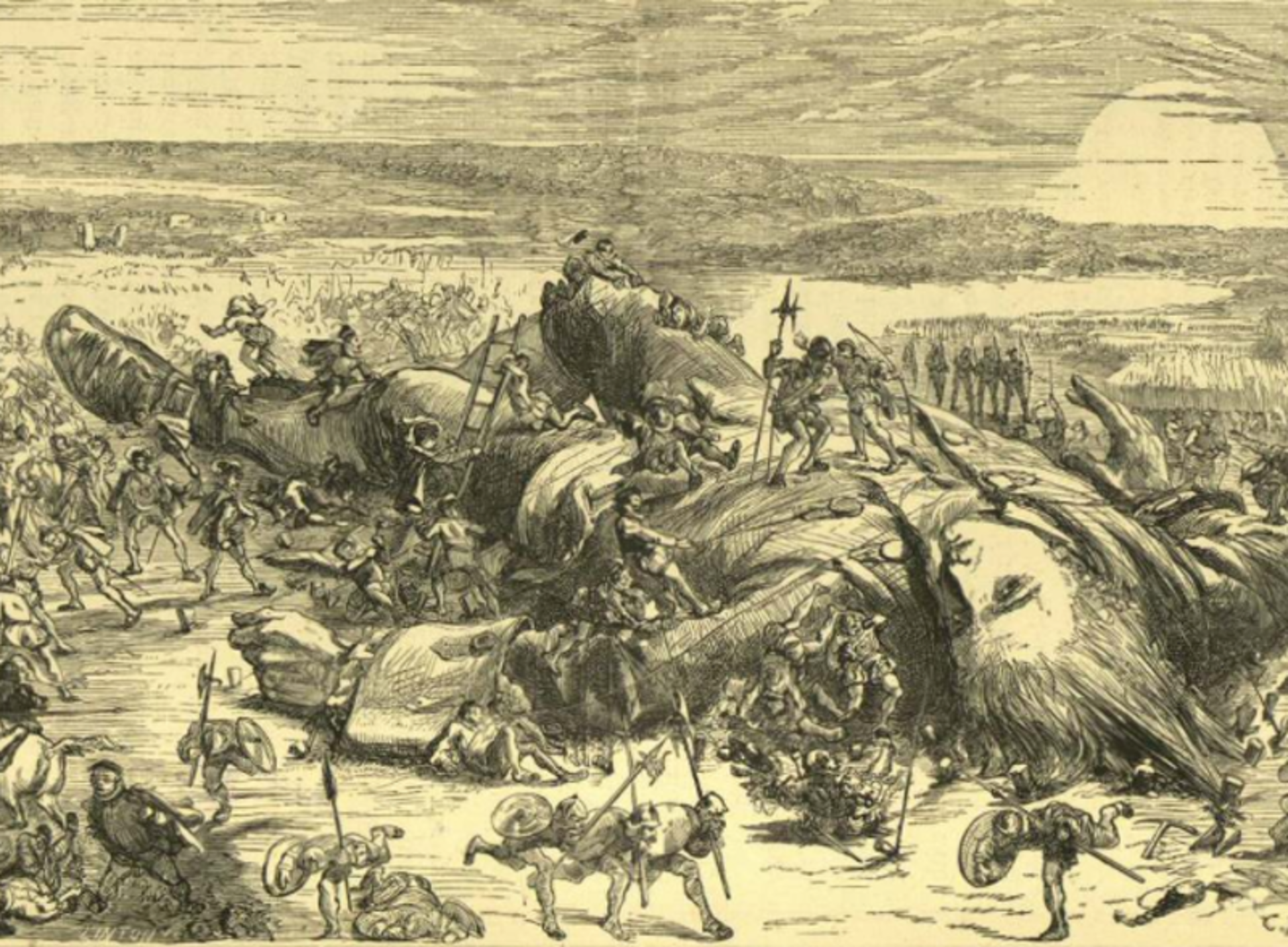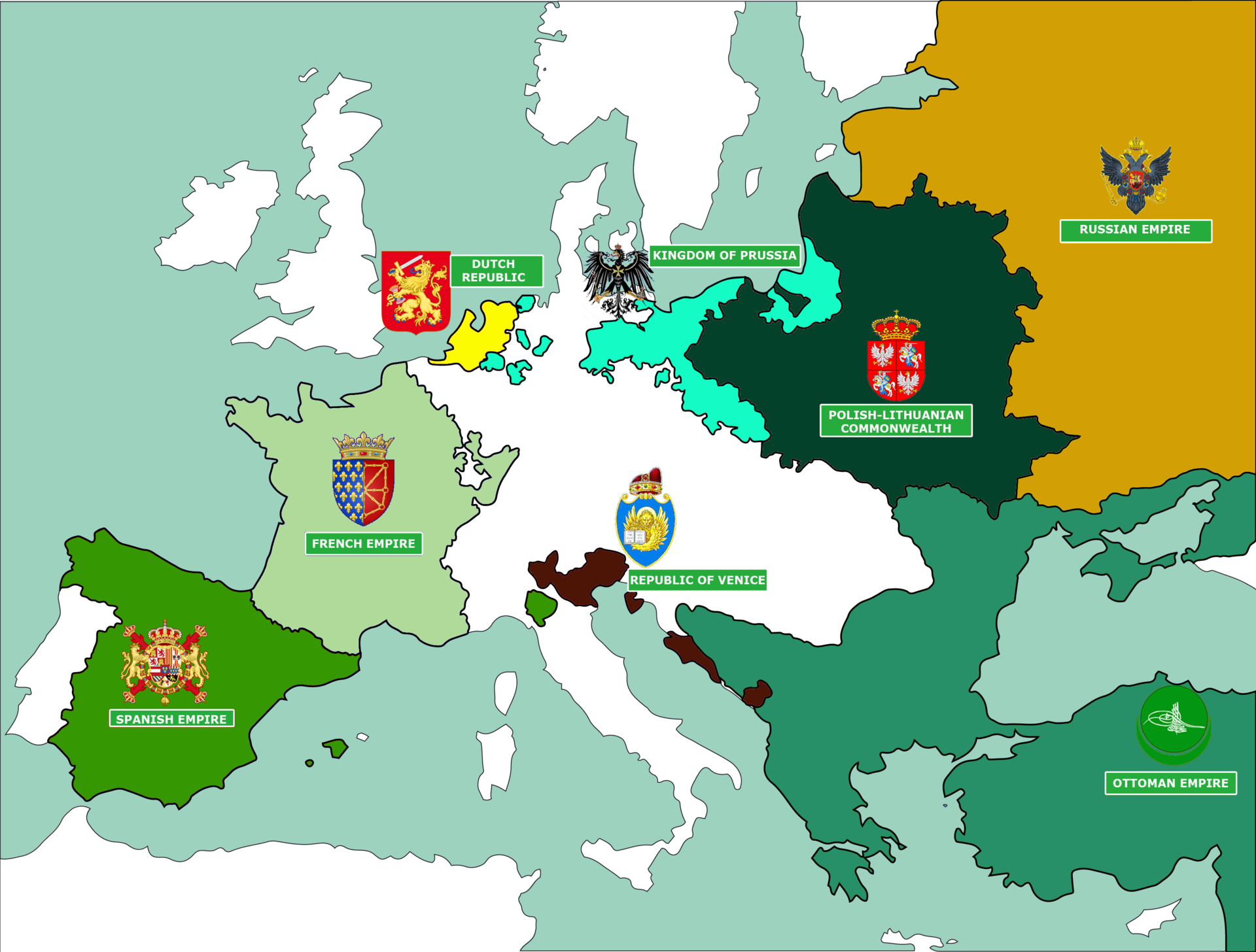European Championship 1748
The border between the Ottoman Empire and the Habsburg Monarchy was stabilized in the Southeastern Europe; Russia becomes the leading force on the Baltic; Spanish Bourbons carry out the reconstruction of the entire Spanish Empire; the Seven-year war was led around the American and Asian colonies; The Habsburgs secure a title of the Holy Roman emperors, etc.
After three wars by Catholic forces against the Ottomans, the borders of the Ottoman Empire with the Venetian Republic and the Habsburg Monarchy in Southeast Europe consolidated on the Danube, Sava and Dinaric hinterlands of the Adriatic coast. It which will also have lasting effects on the territorial boundaries of future states in the area. In the Baltic, roles have been replaced in several decades, with Polish-Lithuanian and Swedish power declining, with the rise of Russia, whose rulers moved from Moscow to the newly established St.Petersburg. The power of the Spanish kings, where the Bourbons came to power in the early 18th century, was steadily declining. However, with series of agreements with the Austrian Habsburgs spanish Bourbons have gained control of Naples, Sicily and Parma, while the Habsburgs acquired Milan and Tuscany. Sardinia and Piedmont, in turn, unite under the Savoy into one kingdom.
In 1748 the Eight-year war for Austrian heritage ended. It is true that the Habsburg Pragmatic Sanction was accepted by the leading European powers in the first half of the 18th century, but the agreements were obeyed only when it required benefit or fear. Thus, opponents of the Habsburg heiress Maria Theresa, as a woman, challenged the inheritance rights to the Habsburg estates throughout Europe which she inherited but also the title of Empress of the Holy Roman Empire. After a series of upheavals, the final balance of the war was that Maria Theresa's husband became emperor of the Holy Roman Empire, Prussia entered the ranks of major European powers, and tensions over colonial possessions between Great Britain and France continued.
The 18th century saw a significant decline of religious passions and extreme spiritual strife. Relieves the active pressure of Catholicism, which also alleviates the dogmatic rigor of Protestantism. Because of its central importance in individual Bible reading, Protestantism encouraged literacy and the development of the press and affected the freedom of consciousness in man. All things that have been taken for granted now are looking for a new definition, so science and economic advancement are coming, which in the 18th c. to make the period of the Enlightenment. His intellectual movement will play an important role in supporting the pursuit of happiness in worldly life. Philosophers have applied the ideas of scientific progress to change the way people think about power and society. Realizing that a good life does not have to be based on a particular religious view, they argued that the progress of the state depended on the separation of religion from politics, and ignorance was associated with religious restraint from their point of view. Protestant ethics emphasized the values of hard work and renunciation of pleasure, more conducive to the creation of economic means (capital) and re-productive investment than consumption, which in the coming centuries, first in the UK, will influence the emergence of the industrial revolution and the development of a new economic and social system - capitalism.
It has become clear that who rules the sea, rules commerce, who rules world trade, rules the world's riches, and therefore the world itself. This will be best understood by the United Kingdom, which dates back to the early 18th century when the Scottish Parliament dissolved itself in exchange for seats in the London Parliament and the share of trade and imperial expansion in the enlarged country. The United Kingdom emerged as a guide to European fate, and its leadership relied much more on alliances, trade monopoly and maritime surveillance than on direct occupation of the territory. It will participate in almost every major city in every corner of Europe and, step by step, build the Empire to accumulate its trading privileges, strategically important islands and passageways. The crucial event that made the UK the leading naval force in the world was the Seven Years' War (1756-63), with which it afforded numerous African, Asian and American colonial gains.

Sources
- Jeremy BLACK, Povijest Britanskih otoka, Zagreb, 2004.
- Fernard BRAUDEL, Civilizacije kroz povijest, Zagreb, 1990.
- Niall FERGUSON, Civilizacija: Zapad i ostali, Zagreb, 2012.
- Felipe FERNANDEZ-ARMESTO, Narodi Europe, Zagreb, 1997.
- Daniel GOLEMAN, Destruktivne emocije : kako ih možemo prevladati?, Zagreb, 2005.
- Grupa autora, Povijest: Doba apsolutizma (17. stoljeće), knjiga X., Zagreb 2008.
- Grupa autora, Povijest: Doba prosvjetiteljstva (18. stoljeće), knjiga XI., Zagreb 2008.
- Grupa autora,''Prvi svjetski sukob''.Velika ilustrirana enciklopedija, Zagreb, 2009.
- Grupa autora, ''U potrazi za mirom i blagostanjem: hrvatske zemlje u 18. Stoljeću'', Povijest Hrvata, sv. V, (ur.Lovorka Čoralić), Zagreb, 2013.
- ''Kapitalizam'', http://www.enciklopedija.hr/Natuknica.aspx?ID=30315
- Sources for maps:
- http://hillfighter.deviantart.com/art/Europe-1765-190214452
- http://mapsontheweb.zoom-maps.com/post/114584426785/map-of-russian-holdings-showing-which-territory
- http://geacron.com/home-en/?&sid=GeaCron270726
Fotografija ''Didn't Know About Literary Classic'', https://www.smithsonianmag.com/arts-culture/eight-surprising-things-its-time-you-knew-about-gullivers-travels-180967328/
